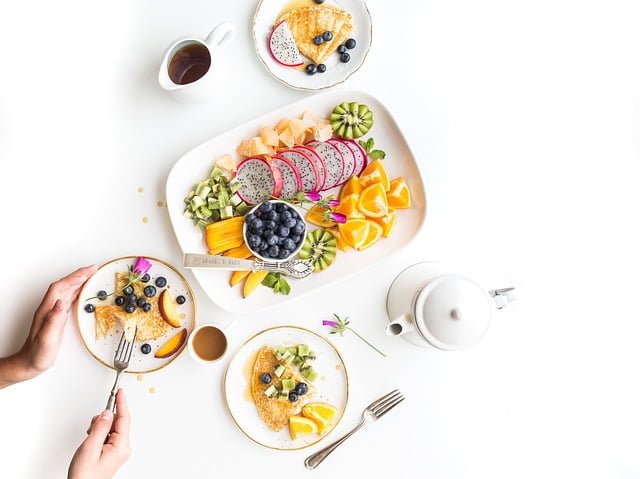Vitamins are like super important things that our bodies need to work well. They help us grow, see properly, make strong bones, muscles, skin, and organs, and also fight off sickness. If we don’t get enough of certain vitamins and minerals, it can cause big problems. To make sure your child grows up strong and healthy, the best thing to do is give them lots of different fresh foods from the five groups of food. These foods include things like whole grain bread and cereals, veggies, fruits, meat, fish, chicken, eggs, nuts, beans, and also dairy stuff like milk, cheese, and yogurt.
Difference between vitamins and minerals:
Vitamins are like special things that are made by plants or animals. They’re kind of organic, which means they’re natural. On the other hand, minerals are like tiny pieces that come from things like soil and water. They’re not made by living things. Plants can take in minerals from the ground, and animals can get them by eating plants or other animals.
Some minerals are really important for your body, and you need more of them. For example, you need a good amount of calcium to help your body grow strong and stay healthy.
This article talks about the vitamins and minerals that are really good for kids and how they work. It tells you about the vitamins and minerals that kids need to grow up strong and healthy. It also explains how kids can get these vitamins and minerals from the food they eat. The article also mentions that sometimes kids might need extra vitamins, and it gives advice on when that might be the case.
Vitamins and Minerals: The Basics for Kids
Your child needs lots of special vitamins and minerals to grow, become strong, and stay healthy. Some of these are:
Vitamins A, B, C, D, E, and K
Also, important stuff called minerals like calcium, iron, iodine, and zinc.
The best way for your child to get these vitamins and minerals is by eating different kinds of foods. These foods come from five groups that are really good for you:
- Vegetables
- Fruits
- Grain foods like bread, pasta, cereal, rice, and corn.
- Healthy dairy foods like milk, yogurt, and cheese, but the ones with less fat.
- Lean meat, fish, chicken, eggs, tofu, and special things like beans, peas, lentils, and nuts.
Vitamins and How to Get Them:
Let’s talk about the vitamins your family needs and how to get them. Here’s a list to help you out:
Vitamin A:
You can find vitamin A in foods like liver, meat, milk, eggs, and orange-colored fruits and veggies like carrots and sweet potatoes. Vitamin A is important for your eyesight, skin, growth, staying healthy, and fighting off sickness.
Vitamin B1 (thiamin):
You can get vitamin B1 from foods like fish, meat, whole grain bread, and fortified cereals. It helps your body use energy from food and makes your nervous system and muscles work properly.
Vitamin B2 (riboflavin):
Vitamin B2 is in foods like milk, yogurt, cheese, eggs, whole grain bread, and fortified cereals. It also helps your body use energy from food.
Vitamin B3 (niacin):
Foods like meat, fish, chicken, nuts, and some spreads have Vitamin B3. It helps your body use energy from food.
Vitamin B6 (pyridoxine):
Vitamin B6 is in foods like meat, fish, whole grains, veggies, and nuts. It helps your body use protein for energy and is important for making blood cells and your brain work right.
Vitamin B12 (cobalamin):
You can find vitamin B12 in foods like meat, fish, eggs, and milk. Some fortified cereals have it too. It’s good for making blood cells and helping you grow.
Vitamin C (ascorbic acid):
Vitamin C is in fruits and veggies, especially citrus fruits, kiwi, peppers, and potatoes. It helps your body fight infections, build strong teeth and bones, and absorb iron from food.
Vitamin D:
Our bodies make Vitamin D when we get sunlight on our skin. Some foods like oily fish, egg yolks, and mushrooms have a bit of it. Vitamin D helps your body take in calcium to keep your bones strong.
Vitamin E:
You can get vitamin E from oils, margarine, seeds, and nuts. It helps your immune system, and your skin and eyes stay healthy.
Vitamin K:
Foods like green leafy veggies, eggs, and beans have vitamin K. Your gut’s healthy bacteria also make some. Vitamin K is important because it helps your blood clot.
Folate (folic acid):
Folate is in green leafy veggies, liver, legumes, and whole grain bread. It helps your body use protein, make new blood cells and DNA. If you’re going to have a baby, getting enough folate is super important. Cooking and processing foods can reduce the amount of folate.
Remember, these vitamins are like little helpers that your body needs to work well. Eating a variety of healthy foods can help you get all these important vitamins.
Getting Important Minerals:
Let’s chat about the minerals that you and your family need and how to get them. Here’s a list to help you out:
- Iron: Iron is in foods like meat, liver, chicken, seafood, beans, egg yolks, and some cereals that have extra iron. Iron is really important for your brain to work well and for making red blood cells that carry oxygen around your body.
- Zinc: You can find zinc in foods like meat, chicken, seafood, milk, seeds, tofu, and whole grain cereals. Zinc helps you grow, heal wounds, and makes your immune system strong.
- Calcium: You can find calcium in foods like dairy products (milk, cheese, yogurt), certain fish with bones you can eat (like sardines and salmon), tofu, and some green leafy veggies (kale and bok choy). Calcium is super good for making your bones and teeth strong.
- Iodine: Iodine is in things like seafood, veggies that grow in soil with lots of iodine, and bread made with a special kind of salt. Most bread from bakeries and stores has this special salt, which gives enough iodine to most people. Iodine helps you grow normally, develop tissues, and control how your cells use energy and oxygen. If you’re a pregnant or breastfeeding person, you need more iodine.
How Different Diets Affect Vitamins and Minerals for Kids?
If your child eats a special kind of diet, you need to be extra careful to make sure they get all the vitamins and minerals they need.
For example, if your child doesn’t eat meat (like in vegetarian diets) or doesn’t eat any animal products at all (like in vegan diets), it can be a bit hard to get enough iron. If your child has allergies or can’t eat certain foods, they might not get enough good stuff like calcium. But don’t worry! You can plan their meals carefully and find other ways to get these vitamins and minerals.
Some kids have a health problem that makes it hard for their bodies to take in food the regular way. If your child has something like coeliac disease or Crohn’s disease, the vitamins and minerals from normal food might not be enough. You can talk to a special doctor or a food expert (called a dietitian) to figure out what to do.
If your child eats lots of foods that are only okay sometimes, like sugary drinks, chips, and cakes, they might eat too much of those and not enough of the good foods with vitamins and minerals. You could try letting them have those foods only on special days, not all the time.
Remember, with some smart thinking and help from experts, you can make sure your child gets all the good stuff they need to grow and stay healthy.
Should Kids Take Extra Vitamins and Minerals?
Our bodies only need a little bit of vitamins and minerals – having too much isn’t always better.
Sometimes, having too much of certain vitamins can be bad for you. Like, too much vitamin A can build up in your body and cause problems. And some minerals, if you take too much, can also make you sick.
If you think your child needs more vitamins or minerals but they can’t eat more foods with those things, you can talk to a doctor or a food expert called a dietitian. They might say it’s okay for your child to take a special pill with those vitamins or minerals.
Being a parent means there’s a lot to think about when it comes to your kids’ health. With so much information out there, it’s hard to know what’s right. But don’t worry! Figuring out what good stuff your kids need to eat is actually pretty simple. Keep reading to find out what those important things are.
Kids Who Eat Only Plant Foods:
If your child only eats plant foods (like fruits, veggies, and grains), they might need a vitamin called B12. This vitamin is mostly found in animal products, not plants. Some plant foods have B12 added.
Kids with Celiac Disease:
If your child has celiac disease (a special kind of sickness), their body doesn’t use nutrients well. They might need extra vitamins and minerals to stay healthy. Their doctor can help with the right kind of supplement.
Who Might Need Vitamins?
Most kids who eat a good mix of foods don’t really need extra vitamins and minerals. But sometimes, there are cases when a supplement can be helpful.
Kids with Dark Skin:
Some kids with darker skin might not have enough vitamin D, which comes from sunlight. Dark skin has more of a pigment called melanin, which makes it harder for the skin to make vitamin D. But it’s interesting, because even though they might have lower vitamin D levels, they tend to have fewer bone problems than kids with light skin who have the same vitamin D levels. Right now, there aren’t clear rules about giving vitamin D to kids with dark skin.
Remember, if you’re not sure, it’s a good idea to talk to a doctor or someone who knows about food (called a dietitian). They can help you decide if your child needs extra vitamins.
How to Pick Good Vitamins for Kids?
When you want to give kids extra vitamins, here’s what you should do:
- Look for vitamins that have the right amounts of good stuff kids need every day. Most vitamins have a mix of different things that are balanced.
- Don’t give kids too much of any vitamin. Some vitamins can be bad if you have too much. So, make sure the vitamin you choose doesn’t have more than what’s recommended.
- Make sure the vitamins are in a bottle that’s hard for kids to open. You don’t want them to eat too many by accident, thinking they’re candies.
- Parents and caregivers should pick vitamins that kids can’t open easily. This way, kids won’t eat them like candies.
- Before giving kids vitamins, talk to a doctor. They can help you know if it’s a good idea and tell you the right way to use them.
Tips for Caregivers
When you’re taking care of kids, here are some things to remember about their food:
- The United States Department of Agriculture has a tool called My Plate that can help you plan meals for kids. This tool can show you how to give them the right foods to grow strong and healthy.
- Some kids might have a special health condition that makes it hard for their bodies to use certain good things from food. If that’s the case, a doctor can help you know if they need extra things like vitamins.
It’s important to give kids the right kinds of food to help them grow. If a kid can’t use all the good things in food, a doctor can help decide if they need extra things.
In general, healthy food can give kids the vitamins and minerals they need to grow. But if kids can’t eat certain foods or if they need more help, vitamins can be useful. Remember, kids need different amounts of good things as they grow, so make sure to check the labels on vitamins to see if they’re right for your child. If you’re not sure, doctors and dietitians can give you good advice.


